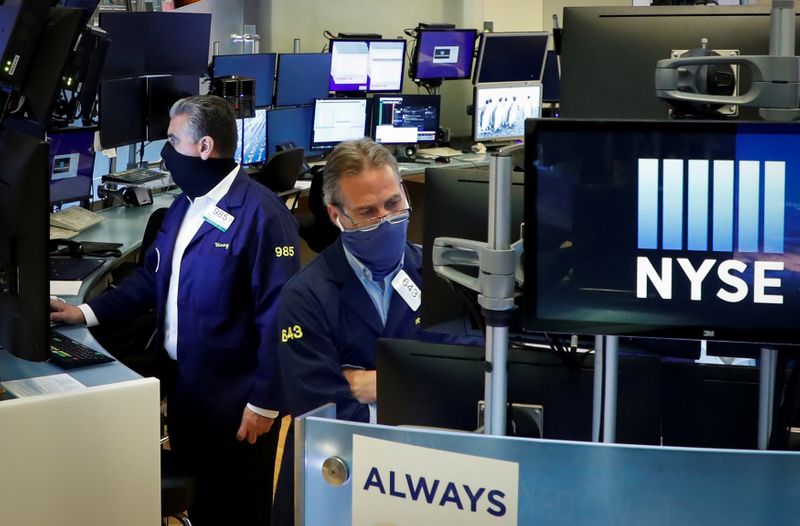By Rodrigo Campos
NEW YORK (Reuters) – A gauge of stocks across the world slipped from record highs on Friday and the dollar edged up against a basket of peers as weak economic data and underwhelming earnings drove investors to reverse some recent risky bets.
Oil prices fell to end the week little changed and the dollar index posted its largest weekly drop in five weeks.
Technology stocks weighed the most on the S&P 500, with IBM and Intel posting 10% and 9% declines, respectively, after underwhelming earnings.
Energy stocks also fell on Wall Street, alongside the price of crude.
With stock valuations nearing levels not seen in two decades, some market participants said new COVID-19 variants and hiccups in vaccine rollouts pose near-term risks for equities.
“If we’re forced to keep the economy closed and it takes longer than we want to get through immunizations and vaccinations for the coronavirus, that’s going to be a little rougher on the market than people apparently anticipated,” said Rob Haworth, senior investment strategist at U.S. Bank Wealth Management in Seattle.
The Dow Jones Industrial Average fell 179.03 points, or 0.57%, to 30,996.98, the S&P 500 lost 11.6 points, or 0.30%, to 3,841.47 and the Nasdaq Composite added 12.15 points, or 0.09%, to 13,543.06.
The three main U.S. indexes closed higher for the week, with the Nasdaq up over 4%.
The recent gains have come in hand with expectations for a near $2 trillion stimulus package for the American economy. On Friday, President Joe Biden said the U.S. economic crisis was deepening and that the government needs to take major action now to help struggling Americans.
The pan-European STOXX 600 index lost 0.57% on Friday after a survey showed economic activity in the euro zone shrank markedly in January, with the services sector weighed by lockdown restrictions to contain the coronavirus pandemic. [.EU]
MSCI’s gauge of stocks across the globe shed 0.44%.
Emerging market stocks lost 0.94%. MSCI’s broadest index of Asia-Pacific shares outside Japan closed 0.85% lower, while Nikkei futures lost 0.23%.
The dollar index rose 0.14%, with the euro up 0.03% to $1.2166, while sterling was last trading at $1.3683, down 0.36% on the day.
The Japanese yen weakened 0.28% versus the greenback at 103.78 per dollar.
Overnight data from Japan showed that factory activity slipped into contraction in January and the services sector was more pessimistic as emergency measures to combat a COVID-19 resurgence hit sentiment.
In commodities, oil prices were weighed down by a build-up in U.S. crude inventories and by worries that new pandemic restrictions in China will curb fuel demand in the world’s biggest oil importer. [O/R]
U.S. crude fell 1.94% to $52.10 per barrel and Brent was at $55.21, down 1.59% on the day.
“The pandemic seems to continue to expand into a second wave in China, with infections rising by the day and reaching again different regions such as Shanghai,” said Rystad Energy oil markets analyst Louise Dickson.
Benchmark 10-year notes last rose 6/32 in price to yield 1.0872%, from 1.107% late on Thursday.
Spot gold dropped 0.9% to $1,853.41 an ounce. Silver fell 1.98% to $25.43.
Bitcoin last rose 9.06% to $33,610.83.
(Reporting by Rodrigo Campos in New York; Additional reporting by Gertrude Chavez-Dreyfuss, Echo Wang, Herbert Lash and Laura Sanicola in New York; Editing by Chizu Nomiyama and Matthew Lewis)





